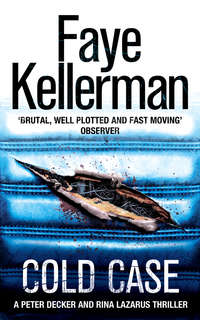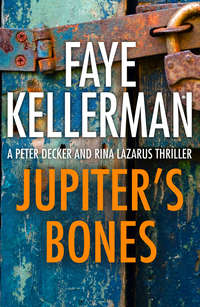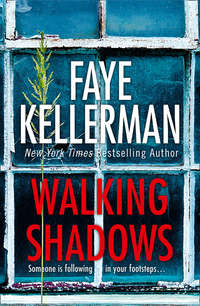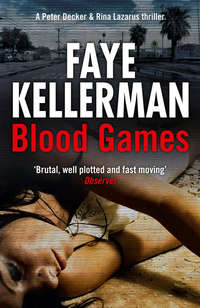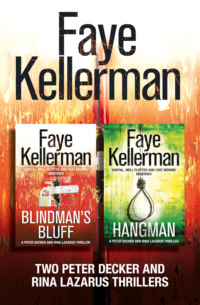
Полная версия
Sanctuary
Gold lit up his smoke.
“I’ve got to give Arik credit, too. He has a great eye for stones—cut and uncut. He can tell at a glance what the stone will look like when it’s cut. All those years working as a stonecutter. He learned the trade from his father. Arik’s taken me to Antwerp a few times. He looks at a diamond. To me, it doesn’t look like much. He says, ‘Shaul, this is the one I want.’ Doesn’t have to cut a window in it or anything.”
“Cut a window?”
“Cut a window,” Shaul repeated. “Open the stone. VerHauten sets a certain price for the uncut stone. Nonnegotiable. But what they will let you do is open a small facet so you can look inside and see what you’re buying before you buy it. Arik doesn’t even need to do that. He can smell it.”
“Where is Antwerp?” Decker asked.
“Belgium. It’s where VerHauten distributes its stones. Everyone big goes to Antwerp.”
“Why Antwerp?”
“Why do you go to the supermarket to buy milk? Because it’s where diamonds are.”
Decker held back a smile. “I meant why did VerHauten set up distribution there? Why not in South Africa?”
“VerHauten wants a center in Europe. And Belgium gives them easy laws.” Gold paused. “Sometimes for a special client, Arik goes to Belgium and buys big uncut stones. Mostly we go to Israel and buy cut, mid-sized stones. More diamonds are cut in Israel than anywhere else in the world.”
Gold rested the cigarette in his ashtray.
“Still, I don’t know anyone who would hurt Arik to put us out of business. This whole thing is very strange.”
Decker flipped the cover over his notepad. “Yes, it is.”
Gold ran his hand over his face. “Even with the gun, I’m worried. Because I don’t know who this enemy is.” He looked at Decker. “You keep looking for them?”
“For a while,” Decker said. “But without a body, we can’t justify looking for an extended period of time. The family may have taken off on their own accord.”
He stood and so did Gold. “We’ll keep in touch.”
Decker walked over to the door, then paused. “Mr. Gold, do you know where Yalom might keep his passport?”
Gold was quiet for a moment. “No. Why?”
“If he took off for anywhere international, he’d need his passport.”
“I don’t know about Arik’s passport,” Gold said. “Come. I’ll walk you out.”
Decker realized that Gold was inching him down the hallway. Yalom’s partner had been cooperative, even loquacious at times. But Decker couldn’t shake the feeling that Gold was holding back. He spoke at length about VerHauten, but little about Arik and his business dealings.
They reentered the sally port. Yochie was about to buzz them out. She said, “Uh-oh. You get company, Shaul.”
Decker looked at the outside TV monitor. A Chasid with a white beard. He was wearing a tall black hat and long black coat.
“Shnorrers,” Gold said with resignation. “They don’t leave me alone.”
“No, they don’t,” Decker agreed.
Gold looked at him. “You know about shnorrers?”
Decker nodded. Ostensibly, they collected money for worthy causes. Sometimes the worthy causes were themselves. Since he had married Rina, they had invaded his house with outstretched hands, and always at inconvenient times. But Rina had a soft heart. She always gave them something.
Shaul said, “Open the door, Yochie.”
She complied. The Chasid touched the mezuzah, kissed his hand, then walked inside. But Gold pushed him back out. Decker followed them into the hallway.
Gold said, “Every day, it’s someone else.”
The Chasid started a pitch in a foreign tongue.
“Maspeek.” Gold opened his wallet and took out a twenty. “That’s all I have. Go.”
The shnorrer didn’t budge.
Gold showed the man his empty wallet. “No more kesef. Lech. Mayveen?”
The shnorrer said, “Ani mayveen.” He looked at Decker.
Decker blew out air, then took out a twenty from his wallet and gave it to the man. The shnorrer pocketed the money, muttered some blessing, then moved on to the next mezuzah down the hallway.
11
Even though it was the job, Marge felt like a snoop. Decker had warned her about the feeling. True she had gone through other houses from the rafters to the baseboards, but in those cases, the occupants had been alive. Though Marge had no evidence that the Yaloms were dead, it didn’t look good. Though the paper still came and the mail was still being delivered, the only living things left in the Yalom place were houseplants.
So with key in hand, courtesy of Orit Bar Lulu, Marge plundered through items, bit by bit, with no one standing over her shoulder, nobody protesting her presence, or cussing her out.
They couldn’t have just fallen off the planet!
Within three hours, she had amassed an abbreviated biography of the Yaloms’ lives, had discovered private matter … secrets.
Dalia Yalom was on the pill and was a hidden lover of the soaps. To wit: magazines featuring daytime serials stowed in a hatbox, along with an autographed eight by ten glossy of a handsome but plastic man. Dalia’s closets were well stocked although there wasn’t an obscene amount of clothing for a woman of her means. But she did have odd tastes. A shoe collection made up of dozens of sneakers—beaded ones, painted ones, embroidered ones. She had tennis shoes made of everything from buckskin to terry cloth, from silk to see-through plastic. A variation of the glass slipper.
Though Marge had sifted through the shoes, one by one, she had found nothing. Satisfying herself that the master bedroom was devoid of clues, she’d moved on to the boys’ rooms.
She’d found Dov’s small stash, not much more than a few measly crumbs of cannabis. Dov’s escape from an overbearing father. She’d also discovered voluminous writings and stories crammed into three binders in the back of his closet. In light of what Decker had told her, Dov’s stories about loneliness and alienation had come as no surprise.
What had surprised Marge had been the secret poetry of the older brother, Gil. Here was a sensitive soul. The writing was amateurish, excessive as only teens can be, but it was thoughtful. The older boy’s poems spoke of flowers budding in a mire of human greed, of good emanating from a cesspool of evil, of the birth of a child cradled from the ashes of the fire. Marge wasn’t quite sure to whom or what the kid had been referring, but the message seemed unusually positive for an adolescent.
Marge had looked and Marge had learned.
Decker fingered the Israeli passports with gloved hands. “Where’d you find these?”
“In a billfold inside the Cross briefcase.” Marge pointed to a black-leather attaché with a gold clasp. “I didn’t even see this luggage set the first time around because the attic closet has such an odd shape.”
“The briefcase was hidden?”
“Not at all,” Marge said. “I just didn’t see it. I thought the closet door just led to finished attic space. At that point, the roof comes down at such a severe angle, you can’t even stand up. So I just poked my head inside and saw the area was empty. It wasn’t until the second time around that I actually ducked inside—at much expense to my back muscles—and saw the space was actually a closet that wraps around the house. There’s this huge storage area on the other side containing the main family luggage. I’ll show it to you if you want, but I’ve already been through it all. The rest of the valises were empty.”
Decker sorted through the papers inside the case—Xeroxes of birth certificates, Social Security cards, insurance cards, INS papers. He wondered where the originals were. If Yalom took the papers with him, why did he leave behind the passports?
Because the two passports he held were the originals. And they were up-to-date. He said, “You didn’t find the boys’ passports?”
“Nope,” Marge said. “And I looked. That could be significant. If the boys whacked the parents, maybe they took an international one-way flight.”
Decker thumbed through Yalom’s passport—pages of stamped entries back into the States, Yalom’s residing country. Then there were many other pages of foreign ink—Canada, Mexico, countries of Western and Eastern Europe including Russia, entries from the Far East, Latin America, and Africa. Lots from Africa—Egypt, South Africa, Kenya, Namibia, Liberia, Angola, Sudan, Ethiopia, Zaire, plus a host of other countries Decker didn’t know existed.
Dalia’s visa was simpler—stamps from Western Europe, Hong Kong, Japan, and the United States every time she reentered the country.
Marge said, “Yalom was quite the Phileas Fogg.”
Decker said, “You sound skeptical about something.”
“An Israeli going to Russia? I thought the Jews were leaving Russia for Israel.”
“Yalom’s a diamond dealer,” Decker said. “Russia has diamond mines.”
Marge paused. “Oh.”
Decker said, “What were you thinking about?”
“I don’t know. Maybe Yalom was helping some of his countrymen to get out of Russia … something like that.”
Decker didn’t answer.
“Farfetched, huh?”
“I wouldn’t say that,” Decker said. “You see a passport like this, you wonder what’s going on.”
“I’m thinking the guy’s an agent. Maybe that’s why the family disappeared.” Marge took his passport and leafed through it. “Lots of Third World countries.”
“I noticed.”
“Okay, so South Africa has diamond mines. His travels there make sense. But what’s in Namibia or Angola?”
“Don’t know.”
Marge handed the passport back to Decker. He flipped through the booklet again. Several entries for each African state he had visited. “I don’t even know why he’d even bother going to South Africa. From what Yalom’s partner told me, VerHauten brings the uncut stones to market in Antwerp, Belgium. The cut stones are bought in Israel.” Decker recapped his conversation with Gold.
Marge said, “So Yalom—even being a diamond dealer—really has no need to go anywhere except Antwerp and Israel.”
“If I understood Gold correctly, that’s true.”
“And if Russia is only dealing with this VerHauten, what could Yalom possibly hope to gain by going to Russia?”
“Only thing that comes to me is maybe Yalom’s talking to people sub rosa,” Decker said. “Maybe he’s making inroads that Gold doesn’t know about.”
“He’s double-dealing his partner?”
“It’s been known to happen.”
“His partner finds out, gets mad, and whacks him?”
“It’s been known to happen.”
“I still like the idea of him being an agent,” Marge announced. “What else could explain all that traveling?”
Decker laughed softly.
“Go ahead,” Marge said, testily. “Scoff.”
Decker smiled again. “No, it’s not that.” He glanced around the house. “I’m just thinking that Mossad must pay pretty damn well.”
“Didn’t you say the wife paid for the house?”
Decker nodded. “I’ll ask Gold about his partner’s wanderlust.”
“Maybe they’re in some kind of covert operation together, Pete,” Marge said. “Maybe that’s why they used to meet at Yalom’s house instead of the office downtown.”
Decker remembered Gold not wanting to talk in front of the secretary. And when he asked about the meetings at the house, about Mrs. Yalom.
Dalia is not a problem.
Yalom and Gold—agents.
Six years in the Israeli army. Makes you comfortable with guns.
Decker didn’t know what comprised mandatory conscription for the Israeli army. He made a mental note to ask Rina. Then he laughed to himself, surprised by his runaway imagination.
“What’s so funny?” Marge asked.
Decker said, “Nothing really. Just thinking about the blanks in the case, how the mind fills in the blanks with foolishness. We should stick to what we know.”
“Which isn’t much.”
“We know a family disappeared. Yet the house looks undisturbed to the eye. No signs of sudden packing, valuables in place.”
“So let’s assume the family didn’t take off on their own. Assume murder.”
“What would be the motivation for a murder?” Decker asked. “No apparent robbery had taken place. By Gold’s own account, no stones were missing from inventory.”
“That’s why I like my spy theory. Someone wanted them out of the way for reasons other than money.”
Decker’s head began to pound. “Money could still be the motive.”
“What do you mean?”
“Marge, who would benefit from the parents missing?”
“The boys.”
“Right. And their passports are missing. Who else would benefit?”
“Possibly Orit. And maybe the partner, Gold, too.”
“Also consider this,” Decker said. “We really don’t know if the stones are missing. Could be Gold took the diamonds or Orit took the jewels. They could be telling us that nothing’s missing, but in reality, they could have cashed out the goods.”
Marge was silent. Then she said, “What we really need is an old-fashioned body.”
“It would help.” Decker rubbed his eyes with his bicep. “I’m going over to that shopping center. Where Dov made the phone call to Sharona. At least it puts him alive as of forty-eight hours ago.”
“I still like my spy thing,” Marge said.
Decker said, “So do I.”
“You do?”
“Yeah. I’d love to get my hands on Gold’s passport. See if it’s as funny-looking as Yalom’s. I wonder if we’re getting in over our heads.” Decker smiled. “Maybe I’ve read too many novels about Mossad.” Again, he waited a beat. “Then again, Mossad agents did kill the wrong guy in Norway about a decade ago. Even spies make mistakes.”
Marge said, “Hey, if you think this guy is into some kind of secret shit, I’m outta here. Cattle prods on the genitals is not my idea of a good time.”
Decker said, “Let’s not get carried away. But I am keeping an open mind. Though he downplays himself, Gold’s no dummy. I wouldn’t put anything past him.”
“Know what I do think?” Marge said.
“What?”
“I think it’s time to get some lunch.”
Decker’s house was eerily quiet except for the electronic chatter of a game-show host.
Rina never watched game shows.
A moment later, Ginger pranced out and jumped on Decker’s chest, spraying a cloud of red fur and dander into his eyes.
“What’s going on, girl?” Decker asked the Irish setter. “Who’s watching TV?”
The dog licked Decker’s face. Decker shouted out “Hello?” but there was no answer.
“Someone leave the TV on, girl?”
Decker stepped into the dining area and stopped in his tracks. Seated around his homemade cherrywood table were four children who looked straight from the prairie. The two girls were garbed in high-necked dresses and opaque stockings; the boys had on black suits, white shirts, and hats. The eldest, who looked to be around Sammy’s age, was reading a volume of Talmud. The other three kids were engaged with the TV. Upon Decker’s entrance, their eyes went from the screen, to Decker, then back to the screen. The oldest boy looked up from his religious book, then quickly buried himself back in his study.
No one said anything. No one moved. Decker cleared his throat. “You’re the Klein kids?”
Silence except for the television. Finally, the older girl spoke, her eyes still on the TV monitor. “Are we in your way?”
Decker hesitated. “Uh, no. Not at all.”
The youngest, a boy, raised his head and caught Decker’s eye. Shyly, he asked, “Are you the cowboy?”
His sister elbowed the boy in the ribs.
“The cowboy,” Decker repeated. “Well, I ride horses and wear a hat. So I guess some people would call me a cowboy. Anyone know where Mrs. Decker is?”
Again, the elder girl piped up. “She had a doctor’s appointment with the baby that she forgot about. She’ll be back soon. Then we’re going to the zoo or something like that. Our mother told us to sit here and don’t move a muscle. Are you sure we’re not in your way? If we are, we can move.”
The kids didn’t seem unduly nervous at being dropped into a foreign land. As a matter of fact, they seemed unusually trusting, a testament to their sheltered life.
“I’m positive you’re not in my way.” Decker paused. “Your mother went with Mrs. Decker?”
The youngest boy said, “She took a walk. She told us to sit here and not move.”
The older girl squinted at the TV, eyes a mixture of awe and cynicism. “I don’t understand what’s going on.”
“Pardon?” Decker asked.
“In this game. I think if she guesses the price of the washing machine, she actually gets to keep it?”
Decker bit his mustache. “Uh, yeah, I think that’s how it works.”
The girl turned to him, her face full of confusion. “It isn’t a joke?”
“Uh … no, it’s no joke.”
“That is unbelievable!” the girl said. “You mean they just give that lady a washing machine?”
“If she wins, yes.”
“How can they do that!” the girl exclaimed. “Why would they give away a washing machine? Isn’t that expensive?”
“And the automobile,” the little boy chimed in. “That’s real ispensive!”
Decker paused. How do you explain the corporate world and prime-time advertising to kids who never owned TVs.
The girl still had her eyes glued to the monitor. “How do you get to play that game? You got to give them money or something?”
“Minda!” the oldest boy rebuked her sharply. “This is not our world!”
“Mendel, Mama could really use a new washing machine.”
“Then Papa will buy her one.”
“Yeah, sure. He never buys us anything.”
“Minda!” the boy scolded.
Minda fell silent. The little boy smiled at Decker. “I saw the horses.”
Decker smiled back. “Would you like to ride one?”
The boy’s eyes grew big. “Can I?”
“Pessy, wait for Mama,” the oldest boy said.
“Good idea,” Decker said, wondering where the hell Mama was. Instead he turned to Mendel and asked him what he was learning. The teenager shrugged, leaning over the volume of Talmud as if hiding his paper from a potential cheater.
Again, Decker bit his mustache. “Anyone hungry?”
“We’ll wait until our mother comes back,” Mendel said. “But thank you anyway.”
Decker shuffled his feet. “How long has your mother been gone, kids?”
Minda said, “About half an hour. Before Joker in the Deck … will you look at that! She won a whole living room full of furniture! I can’t believe it!”
Decker smiled tightly. “Is anyone hungry?” He looked at the youngest. “Are you hungry, Pessy?”
“He’ll wait,” Mendel said.
“Don’t be such a meanie, Mendel,” Minda said. “Are you hungry, Pessy?”
The little boy looked at his brother. His brother nodded. Pessy said, “I’m a little hungry.”
“I can fix you a sandwich,” Decker said. “What would you like? Tuna? Egg salad? Peanut butter and jelly?”
“Peanut butter and jelly,” Pessy said. “Please.”
“Coming right up.” Decker stood. “How about you, Mendel? Anything?”
Mendel blushed. “I’m okay.”
“You’re sure?”
Minda said, “Go ahead, Mendel. You already checked out the kitchen. It was fine.”
Mendel glared at his sister. Decker said, “I’m glad you checked out the kitchen. I want you kids to feel comfortable here.”
Minda said, “Thank you very much. And thank you for letting us stay here. I’ve never seen a game like this in my life. It’s fascinating!”
“It’s beetul Torah,” Mendel said.
“Mendel, relax, okay?” Minda said. “It’s vacation!”
Конец ознакомительного фрагмента.
Текст предоставлен ООО «ЛитРес».
Прочитайте эту книгу целиком, купив полную легальную версию на ЛитРес.
Безопасно оплатить книгу можно банковской картой Visa, MasterCard, Maestro, со счета мобильного телефона, с платежного терминала, в салоне МТС или Связной, через PayPal, WebMoney, Яндекс.Деньги, QIWI Кошелек, бонусными картами или другим удобным Вам способом.


